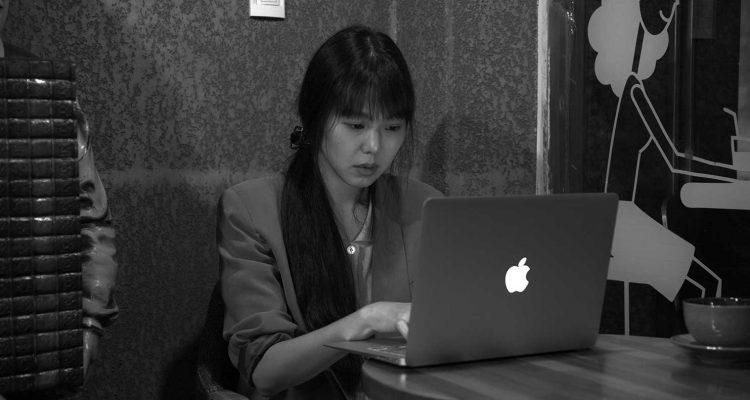2017 was a career apex for busy filmmaker Hong Sang-soo, who released three (!) films on the festival circuit and all to effusive praise. How then does the South Korean director follow up this prolific benchmark? By making more films, of course! The first out of the gate is “Grass,” debuting in the avante-garde leaning Forum section of the Berlin International Film Festival. Clocking in at a scant 66 minutes, this brief-but-dense feature is likely to challenge more recent fans of Hong Sang-Soo while it harkens back to the more opaque quality of his earlier work.
Areum (Kim Min-hee) occupies the corner of an out-of-the way café, clacking on her keyboard. She takes advantage of her discreet position to eavesdrop on the couples coming together and falling apart in the coffee shop. We are introduced to at least four pairings, most of which involve a writer or an actor. As the film progresses, characters introduced earlier reemerge and interact in new combinations. Only in a Hong Sang-soo film does a quartet — rather than a twosome — drinking smuggled soju in a café constitute as a late-breaking, major narrative event.
Of course, this being a Hong Sang-soo film, the storytelling isn’t so simple, and the cut that introduces Areum suggests that the patrons — some, or all — are figments of her imagination. On more than one occasion she has to explain that she is not a writer, and the substance of her journaling hangs over the film. Whenever the layers of reality become too legible, a cut, voiceover or a detail in the dialogue once again tangles what we understand to be real or fictional. Before long, it becomes clear that the distinction is not as important as the romantic dissonance that emerges from the characters’ banter.
The spare story of “Grass” keeps the focus on the bones of the interactions between men and women, which swing wildly from tenderness to outbursts of rage. The shadows of those not present hang over the interactions; the opening couple speak of a young woman who committed suicide, opening up a theme that is threaded throughout the film. This deep into Hong’s body of work, his characters’ penchant for knocking back soju is surely a wink to the audiences that see it as his movies’ defining trait; mentions of drinking too often or not often enough are the only moments that earn chuckles in an otherwise dour effort.
Every new Hong film brings a deviation from the director’s tried-and-true formula. At just over an hour in length, “Grass” doesn’t allow for a great deal of experimentation outside of the antiquated narrative jumble. There is one sequence in the second half of the film that stands apart, both for the acidity of the dialogue and its mutation of the familiar two-shot. In this case, Hong’s camera takes an over-the-shoulder vantage of an unnamed couple’s conversation at a table, refusing the audience a view of the man’s face as he verbally berates the woman across for him. The topic of conversation is the woman’s role in driving a man to suicide; it’s as if we’ve stepped out of the inebriated comfort of Seoul only to find ourselves in Ingmar Bergman territory.
Performances among the ensemble are par for the course, if unremarkable. This includes Kim Min-hee, who is given less dramatic heavy lifting here than her previous collaborations with Hong — it’s a disappointment knowing what she’s capable of. On the technical end, “Grass” is also the simpler side. Again employing black-and-white photography, the images don’t scale the same heights as 2011’s “The Day He Arrives” or last year’s “The Day After.” Minor details in the two locations add to the unassuming locations, like a decal of a couple on the café window, rhyme with the pairing of people within and Hong’s signature composition. The classical music that blares over the business’ stereo is an interesting counterpoint, passing in and out of the diegesis. At times, the soundtrack suggests melodrama and in other moments it works counter to the tone of the conversations.
Hong Sang-soo’s work is often read through an autobiographical lens, particularly in light of the scandal that surrounded his real-life relationship with Kim Min-hee. Going against the grain of this common interpretation, “Grass” looks at a feedback system between the artist and the art that goes both directions. When Areum lashes out at her brother and his girlfriend as they reveal their intentions to marry, it’s easy to believe her cynicism after all the toxic relationships she’s been privy to up to that point. Does she bring this sour perspective to her practice, or is it the inverse—that Areum reflects her cynical mindset onto her encounters out in the world? For all the artists that populate Hong’s cinematic universe, the director has yet to foreground the creative psyche in as thought-provoking of a manner as he does in “Grass.” [B]
Browse through all our coverage of the 2018 Berlin International Film Festival by clicking here.

